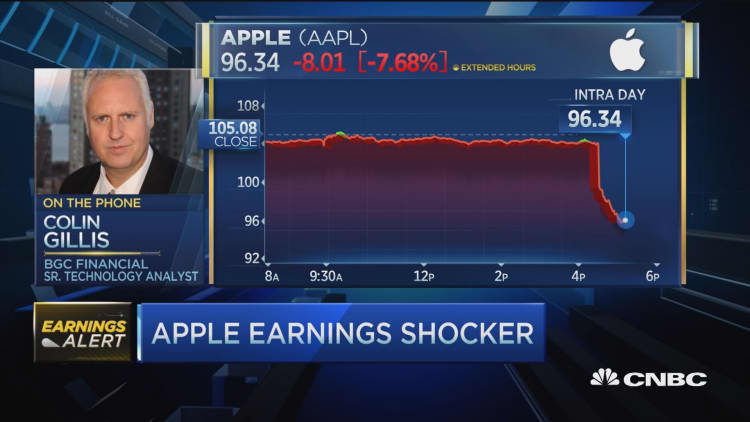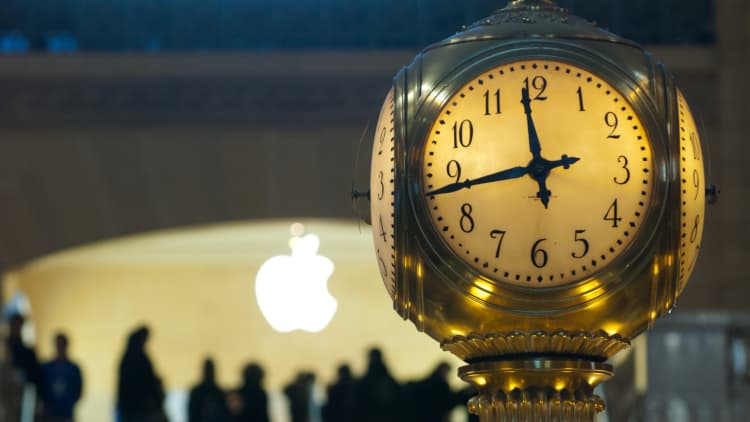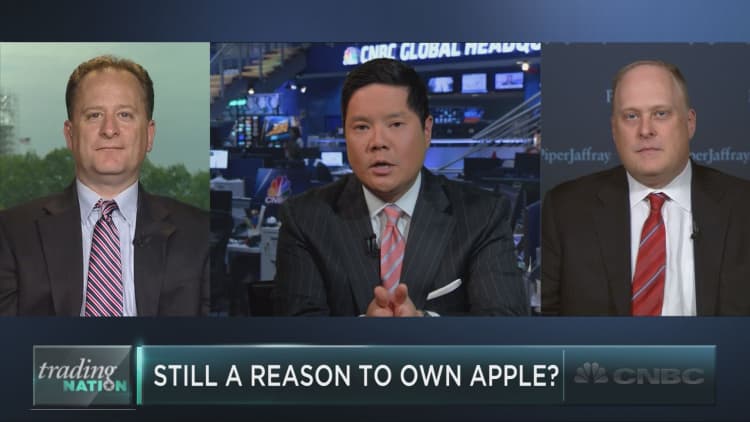


Apple's sales in China tumbled in the second quarter after currency headwinds hurt Hong Kong sales, the company said in Tuesday's earnings.
"The vast majority of the weakness sits in Hong Kong," Apple CEO Tim Cook told analysts in an earnings call. "The Hong Kong dollar being pegged to the U.S. dollar, and therefore it carries the burden of strength of U.S. dollar. And that has driven tourism, trade and international shopping down significantly compared to what it was in the year ago."
The company reported quarterly earnings and revenue that missed analysts' expectations, with revenue declining year-over-year in every region. But China saw the biggest share of declines: Greater China sales, once the tech giant's fastest growing market, fell to $12.49 billion in the second quarter, the company said, a 26 percent year-over-year decline.
Excluding Hong Kong and Taiwan, mainland China saw sales decline 11 percent on a reported basis, and 7 percent on a constant currency basis, Cook said. But people need to look under the numbers, Cook said, as LTE adoption increases and more Apple stores open in the region.
"When I look at the larger picture, I think China is not weak as is talked about," Cook said. "I see China as ... a lot more stable than what I think is the common view of it. We remain really optimistic about China."
Chief financial officer Luca Maestri said the business in China was "better than the numbers might suggest."
"We had significant inventory channel reductions and currency weakness which affected our reported revenue," Maestri said in an earnings call. "Keep in mind that we were up against an extremely difficult year-ago compare when our mainland China revenue grew 81 percent. We remain very optimistic about the China market over the long-term, and we are committed to investing there for the long run."
But speaking in January, Cook warned that the company had seen "some signs of economic softness" in the Greater China region.
That business segment, which includes mainland China, Taiwan and Hong Kong, is a key area of growth for the U.S. tech giant, but Cook acknowledged in January that it had been something of a "turbulent environment." China has seen its pace of economic expansion slowing in recent quarters, and its stock markets have taken investors on a roller coaster ride during that time.
"Something's wrong in China," Gene Munster, managing director and senior research analyst at Piper Jaffray, wrote in a research note after the earnings. "Guidance appear negatively impacted by a sharp deceleration in China ... Overall we see few bright spots in the March report and June guide."
Beyond macroeconomic factors, Apple's position in China is under fire by domestic firms, and it could even see the government in Beijing crack down on its success in the country.
Speaking with CNBC earlier this week, billionaire Chinese entrepreneur Jia Yueting said Apple is "outdated," and charged that it has not been innovating at a sufficient pace.
"One of the most important reasons [for slowing sales] is that Apple's innovation has become extremely slow," he said. "For example, a month ago Apple launched the iPhone SE. From an industry insider's perspective, this is a product with a very low level of technology...We think this is something they just shouldn't have done."

Cook admitted in the earnings call that the smartphone market was not growing but attributed it to a passing "overhang of the macroeconomic environment in many different places in the world."
And Cupertino, California-based Apple could face increased scrutiny from Beijing, which has sought to exercise control over many other U.S. tech companies.
"I'd be very surprised in five years' time if we see Apple having the kind of access to the Chinese consumer that they presently enjoy," Ian Bremmer, founder and president of the Eurasia Group, told CNBC's "Squawk Box" on Monday.
But Cook has continued to sound an optimistic note on China throughout that time. Tuesday's report showed what Cook called "tremendous" success of Apple Pay in China, for instance. Drexel Hamilton analyst Brian White said even after the earnings, he was looking forward to new geographic opportunities in certain Chinese cities.
"Beyond the short-term volatility, we remain very confident about the long-term potential about the China market and the large opportunities ahead of us, and we are maintaining our investment plans," Cook said in January, adding that he does not "subscribe to the doom and gloom kind of predictions."
—CNBC's Josh Lipton contributed to this report.






